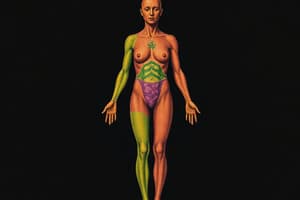Podcast
Questions and Answers
Which type of epithelial tissue is characterized by cube-shaped cells?
Which type of epithelial tissue is characterized by cube-shaped cells?
- Cuboidal epithelium (correct)
- Transitional epithelium
- Columnar epithelium
- Squamous epithelium
Where is cartilage tissue commonly found in the human body?
Where is cartilage tissue commonly found in the human body?
- Small intestine
- Blood vessels
- Heart
- Nose, trachea, and skeleton (correct)
What is the function of smooth muscle tissue?
What is the function of smooth muscle tissue?
- Causing involuntary contractions in internal organs (correct)
- Maintaining posture
- Facilitating communication between cells
- Allowing voluntary movement
Which type of tissue is responsible for transmitting nerve impulses throughout the body?
Which type of tissue is responsible for transmitting nerve impulses throughout the body?
In which area of the body would you find skeletal muscle tissue?
In which area of the body would you find skeletal muscle tissue?
What is the main function of blood as a connective tissue?
What is the main function of blood as a connective tissue?
What is the main function of epithelial tissue?
What is the main function of epithelial tissue?
Which type of tissue includes skeletal, smooth, and cardiac subtypes?
Which type of tissue includes skeletal, smooth, and cardiac subtypes?
Where is epithelial tissue mainly found in the body?
Where is epithelial tissue mainly found in the body?
Which tissue type provides support, binds organs together, and facilitates cell communication?
Which tissue type provides support, binds organs together, and facilitates cell communication?
What is the main role of muscle tissue in the body?
What is the main role of muscle tissue in the body?
Which type of tissue is composed of specialized cells called neurons?
Which type of tissue is composed of specialized cells called neurons?
Flashcards are hidden until you start studying
Study Notes
Tissue: The Building Blocks of Life
Tissue is the most basic organized structure in living organisms, serving as the foundation that makes up our bodies. It's a collection of similar cells, working together to perform specific functions. Think of tissues as the bricks that build each organ, the organs that make up systems, and the systems that result in life.
Types of Tissue
There are four main types of tissue that form the basis of all life.
-
Epithelial tissue: Found in the skin, linings of body cavities, and surfaces of organs, epithelial tissue plays a crucial role in protecting the body from the external environment and regulating the movement of substances in and out of cells.
-
Connective tissue: This tissue provides support, binds organs together, and facilitates communication between cells. Connective tissue includes types like cartilage, bone, adipose (fat), and blood.
-
Muscle tissue: Responsible for movement and maintaining posture, muscle tissue includes three types: skeletal (voluntary), smooth (involuntary), and cardiac (heart muscle).
-
Nerve tissue: Composed of specialized cells called neurons, nerve tissue carries electrical and chemical signals that control communication throughout the body.
Epithelial Tissue
Epithelial tissue is formed by cells that lie in sheets, providing a barrier against the external environment, regulating the movement of substances, and secreting various substances. Depending on the number of cell layers and cell shape, epithelial tissue is classified into several types:
- Squamous epithelium: Flat cells that cover large body surfaces, such as the inner lining of blood vessels and the outermost layer of the skin.
- Cuboidal epithelium: Cube-shaped cells that provide protection and secretion functions.
- Columnar epithelium: Taller cells that are found in areas like the inner lining of the stomach and small intestine.
- Transitional epithelium: This tissue adapts to changes in size, such as the lining of the urinary bladder.
Connective Tissue
Connective tissue consists of cells surrounded by an extracellular matrix containing fibers and ground substance. Connective tissue can be found everywhere in the body, providing support, binding organs together, and facilitating communication between cells.
- Cartilage: Found in areas like the nose, trachea, and skeleton, cartilage provides flexibility and strength while reducing friction.
- Bone: A hard, rigid tissue that provides support, protection, and facilitates movement.
- Adipose tissue: Fat cells that store energy, insulate the body, and produce hormones.
- Blood: A fluid connective tissue composed of blood cells suspended in plasma. Blood functions in transportation, protection, and regulation.
Muscle Tissue
Muscle tissue is responsible for movement and maintaining posture, and it comes in three types:
- Skeletal muscle: Striated muscle fibers attached to bones, allowing voluntary movement.
- Smooth muscle: Found in the walls of internal organs, smooth muscle causes involuntary contractions.
- Cardiac muscle: Found in the heart, cardiac muscle helps maintain the heartbeat.
Nerve Tissue
Nerve tissue consists of specialized cells, called neurons, which transmit nerve impulses throughout the body, allowing communication between various body parts.
Neurons have unique properties, such as their ability to communicate with other cells and their specialized structures, including dendrites, cell bodies, and axons.
Understanding these four basic types of tissue and their subcategories will provide a strong foundation for understanding the human body and its processes. These tissues work together to carry out complex functions, allowing us to live and thrive in the world around us.
Studying That Suits You
Use AI to generate personalized quizzes and flashcards to suit your learning preferences.




